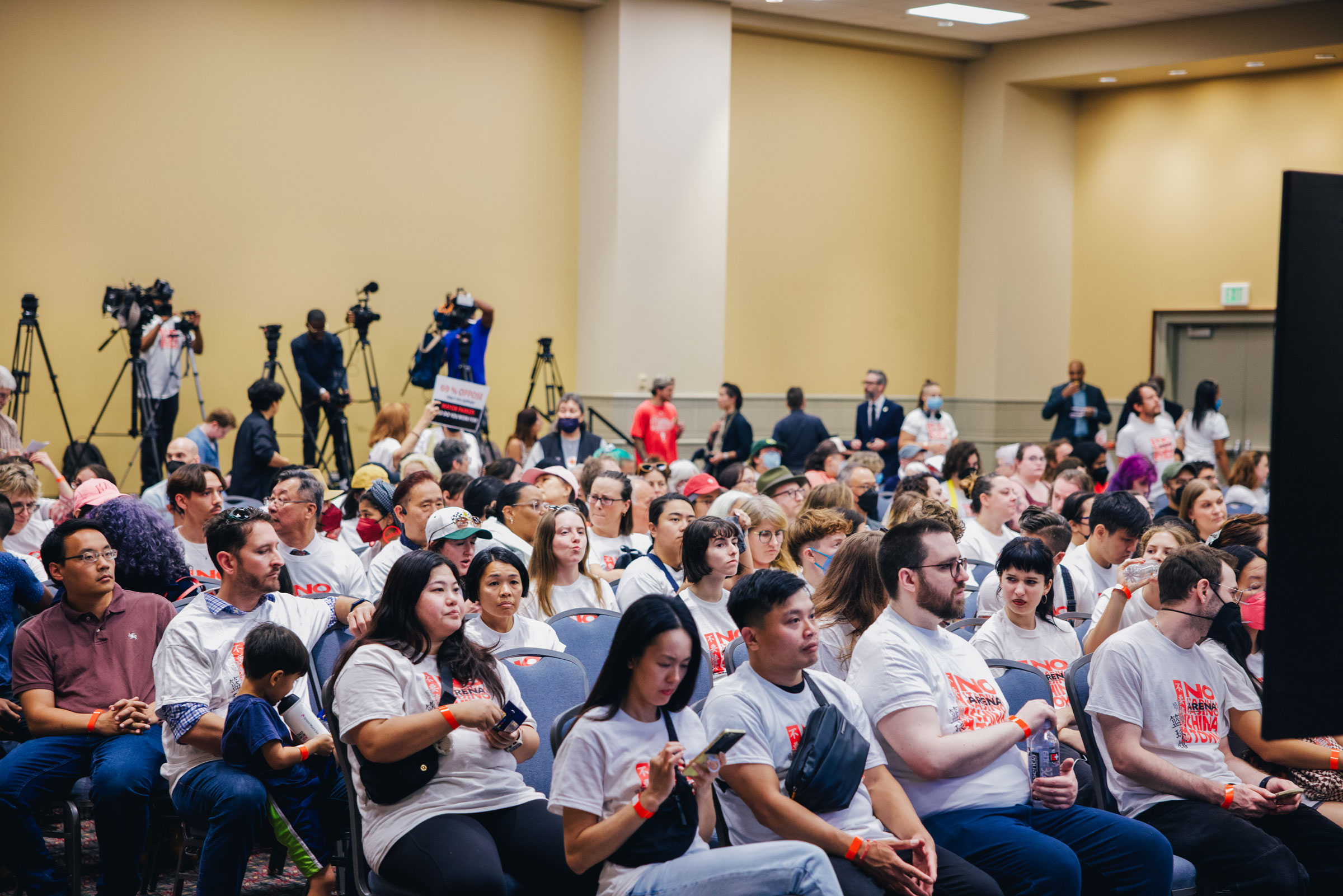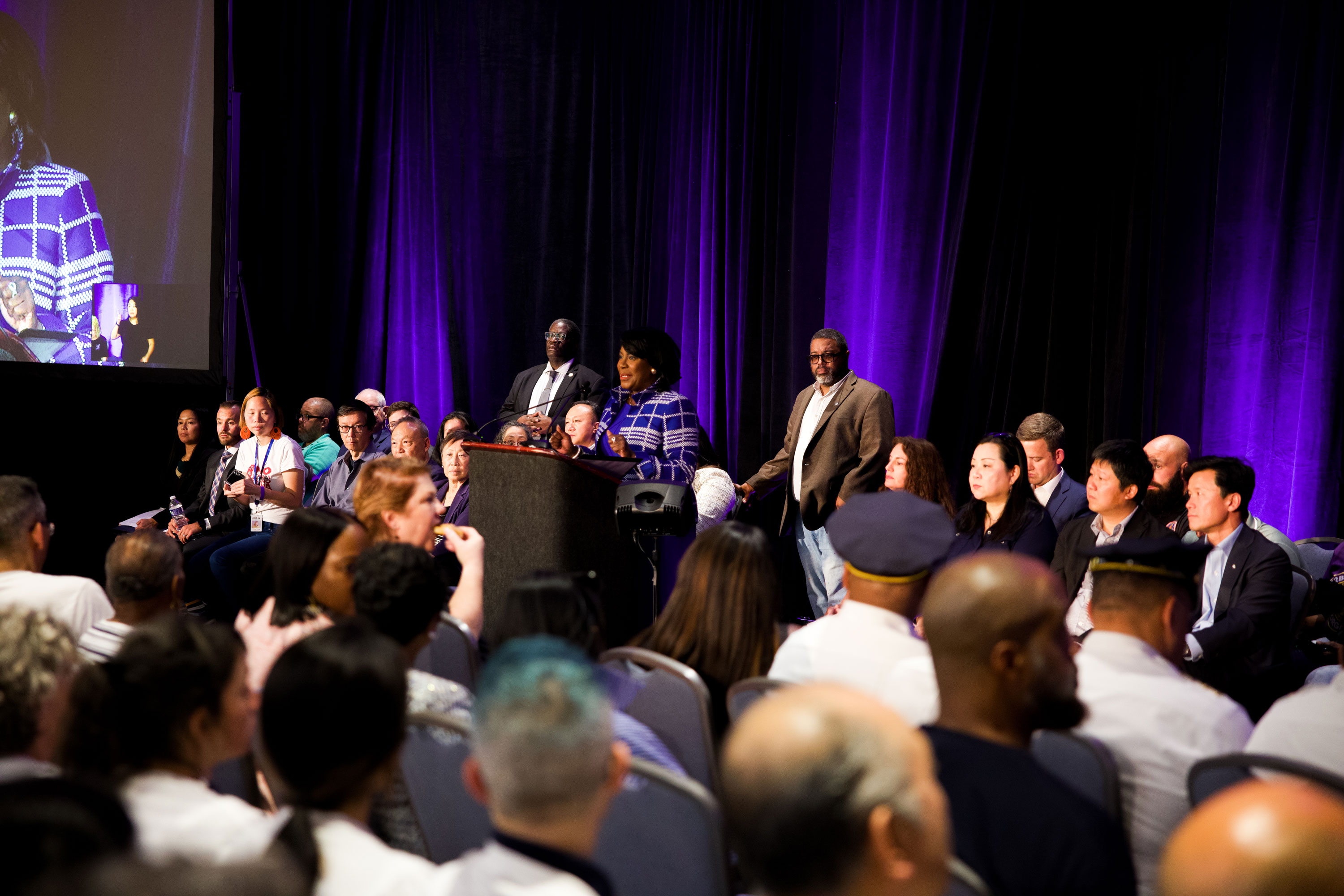Philadelphia
76ers arena plan OK’d by Philly Mayor Cherelle Parker despite opposition
The Sixers’s 76 Place proposal has drawn both excitement and criticism since its unveiling in 2022

The proposed Sixers arena community meeting at the Philadelphia Convention Center on Sept. 11, 2024 City of Philadelphia
The Philadelphia 76ers’ Center City arena proposal has been endorsed by Mayor Cherelle Parker.
A week after the Parker administration hosted a town hall meeting to hear from hundreds of residents and groups regarding the 76 Place arena proposal for Center City Philadelphia, Mayor Cherelle Parker announced her administration reached an agreement with the team to develop an arena in the Market East area.
“My administration has reached an agreement with the Philadelphia 76ers for an arena in Center City and I will be transmitting the related legislative package to our City Council of Philadelphia for its consideration, where it must be approved,” Parker said in a video released Wednesday afternoon. “This is an historic agreement. It is the best financial deal ever entered into by a Philadelphia mayor for a local sports arena and I wholeheartedly believe it is the right deal for the people of Philadelphia.”
The city’s NBA team has said there is no alternative other than what’s been pitched as a privately funded 18,000-seat arena in the city’s Market East neighborhood, even as the team’s lease with the Wells Fargo Center is set to expire in 2031. The Sixers have pointed toward scheduling conflicts with the Philadelphia Flyers and the need for a state-of-the-art arena to compete nationally, as the primary reasons for wanting out of the South Philadelphia sports complex.
The $1.55 billion Center City arena – the most recent development project proposed for Philadelphia’s Market Street East and Chinatown neighborhoods – has received massive pushback from nearby residents and community advocates, who argue such a project would forever change the community and culture of one of the nation’s oldest Chinatowns.
The Save Chinatown Coalition, a group of more than 245 organizations, small businesses, registered community organizations, faith congregations, and city wards, has vociferously and continuously opposed the development.

“Mayor Parker still hasn’t met with Chinatown after all this time, yet feels she can have a stance on whether our community should live or die,” Debbie Wei, a longtime Chinatown community member and member of the Save Chinatown Coalition, said in a statement Wednesday afternoon. “This was never about one person, and this fight is far from over. We are going to fight this, and we are going to the mat. It’s on.”
In addition to concerns about displacement and gentrification, opponents said the city’s decision-making process surrounding the proposed development has lacked transparency.
“The Save Chinatown Coalition has invited Mayor Parker on multiple occasions to meet with us and visit this special community: We asked in September 2023, January 2024, February 2024, and March 2024,” Faye Liu, member of Students Against the Sixers Arena, said in a statement prior to the announcement Wednesday. “In every instance, the request was declined or ignored. We are asking the Mayor again: Before you decide whether our community lives or dies, will you come on a tour of Chinatown with us? Will you look our neighbors in the eye?”
Parker, who reportedly met with Chinatown leaders Wednesday, had a message for the community in her video statement, adding that she wants the “rich and vibrant community, and proud history, to not just survive but thrive.”
“I believe we have the best Chinatown in the nation and I am committed to working together with you to support it,” Parker said. “I am proud of and excited about this agreement.”

Save Chinatown advocates have previously said their fight for the community wouldn’t stop; accordingly, upon hearing the mayor’s announcement Wednesday, protesters outside Philadelphia City Hall chanted “Shame” and promised to vote elected officials who support the proposal out of office.
Parker said she will have more details in a formal presentation and will be holding town hall meetings across the city so residents can communicate with the administration regarding the agreement and legislation as the process moves forward.
“This agreement represents more than $1.3 billion of private investment in our city. It will mean hundreds of millions of dollars in new tax revenues…(and) hundreds and hundreds of jobs for Philadelphians. It means an economic opportunity plan, quite frankly, the likes of which have neve been seen in our city. And it represents the start of an unprecedented revival of Market Street.”
Scrutiny of the arena proposal, first announced in 2022, had ratcheted up over the past few weeks. Opponents held a massive rally, with hundreds marching through Market East to criticize it; just days later, the Parker administration hosted a formal town hall where hundreds of people both for and against the plans spoke out.
Many Chinatown residents and community advocates are sounding the alarm about what a new arena and rising property values could mean for the community, while the Black Clergy of Philadelphia and several labor unions have endorsed the project – and the potential jobs and investment a Center City arena could bring.
The major players in City Hall include Parker, Council President Kenyatta Johnson and Councilmember Mark Squilla, who represents the Center City district where the arena would be situated and who has the councilmanic prerogative – a tradition of allowing City Council members to control land-use decisions in their own districts – to determine its future.
Johnson told reporters in early September that although the offer from New Jersey – and its proffered $800 million in tax incentives – has to be taken “seriously,” the Sixers leaving the city “shouldn’t be an option.” Squilla, who attended the Sept. 11 town hall, has said the plan is viable after impact studies on the area are released.
The Parker administration has reportedly been working with the Sixers to draft a package of arena-enabling legislation. If that is presented to City Council soon, Johnson said, it’s possible lawmakers could vote on the arena before the end of the year.
City Council would need to pass zoning legislation, and likely a host of related measures, before construction could start, but Parker hasn’t indicated how far her conversations with council members including Squilla, who could have final say on the matter, have progressed.
